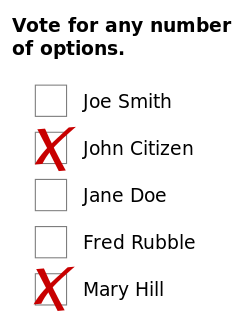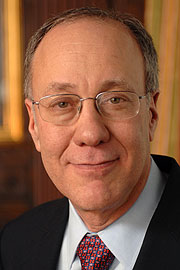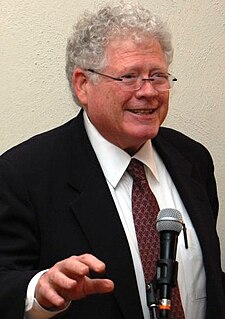Related Research Articles

Approval voting is a single-winner electoral system in which each voter may choose ("approve") any number of candidates, and the winner is the candidate approved by the largest number of voters. A ballot on which multiple candidates may be marked is called an approval ballot. The use of this is what makes it different from other common single-winner systems:

Steven J. Brams is an American game theorist and political scientist at the New York University Department of Politics. Brams is best known for using the techniques of game theory, public choice theory, and social choice theory to analyze voting systems and fair division. He is one of the independent discoverers of approval voting, as well as extensions of approval voting to multiple-winner elections to give proportional representation of different interests.

Gérard Debreu was a French-born economist and mathematician. Best known as a professor of economics at the University of California, Berkeley, where he began work in 1962, he won the 1983 Nobel Memorial Prize in Economic Sciences.

The Kellogg School of Management at Northwestern University is the business school of Northwestern University, a private research university in Evanston, Illinois. Founded in 1908, Kellogg is one of the oldest business schools in the world and has made significant contributions to fields such as marketing, management sciences, and decision sciences. Kellogg's 2-year MBA Program is ranked No. 4 in the U.S. by U.S. News & World Report and Forbes and No. 4 globally by The Economist.

Paul Robert Milgrom is an American economist. He is the Shirley and Leonard Ely Professor of Humanities and Sciences at the Stanford University School of Humanities and Sciences, a position he has held since 1987. He is a professor in the Stanford School of Engineering as well and a Senior Fellow at the Stanford Institute for Economic Research. Milgrom is an expert in game theory, specifically auction theory and pricing strategies. He is the winner of the 2020 Nobel Memorial Prize in Economic Sciences, together with Robert B. Wilson, "for improvements to auction theory and inventions of new auction formats".
In mathematical economics, the Arrow–Debreu model suggests that under certain economic assumptions there must be a set of prices such that aggregate supplies will equal aggregate demands for every commodity in the economy.
Peter Clingerman Fishburn (1936–2021) was an American mathematician, known as a pioneer in the field of decision-making processes.

In an auction, bid shading is the practice of a bidder placing a bid that is below what they believe a bid is worth.

A Japanese auction is a dynamic auction format. It proceeds in the following way.
In mathematics and economics, the envelope theorem is a major result about the differentiability properties of the value function of a parameterized optimization problem. As we change parameters of the objective, the envelope theorem shows that, in a certain sense, changes in the optimizer of the objective do not contribute to the change in the objective function. The envelope theorem is an important tool for comparative statics of optimization models.

Auction theory is an applied branch of economics which deals with how bidders act in auction markets and researches how the features of auction markets incentivise predictable outcomes. Auction theory is a tool used to inform the design of real-world auctions. Sellers use auction theory to raise higher revenues while allowing buyers to procure at a lower cost. The conference of the price between the buyer and seller is an economic equilibrium. Auction theorists design rules for auctions to address issues which can lead to market failure. The design of these rulesets encourages optimal bidding strategies among a variety of informational settings. The 2020 Nobel Prize for Economics was awarded to Paul R. Milgrom and Robert B. Wilson “for improvements to auction theory and inventions of new auction formats.”

Leonid Hurwicz was a Polish-American economist and mathematician, known for his work in game theory and mechanism design. He originated the concept of incentive compatibility, and showed how desired outcomes can be achieved by using incentive compatible mechanism design. Hurwicz shared the 2007 Nobel Memorial Prize in Economic Sciences for his seminal work on mechanism design. Hurwicz was one of the oldest Nobel Laureates, having received the prize at the age of 90.

Susan Carleton Athey is an American microeconomist. She is the Economics of Technology Professor in the School of Humanities and Sciences at the Stanford Graduate School of Business. Prior to joining Stanford, she has been a professor at Harvard University and the Massachusetts Institute of Technology. She is the first female winner of the John Bates Clark Medal. She served as the consulting chief economist for Microsoft for six years and was a consulting researcher to Microsoft Research. She is currently on the boards of Expedia, Lending Club, Rover, Turo, Ripple, and non-profit Innovations for Poverty Action. She also serves as the senior fellow at Stanford Institute for Economic Policy Research. She is an associate director for the Stanford Institute for Human-Centered Artificial Intelligence and the director of Golub Capital Social Impact Lab.
Robert Butler Wilson, Jr. is an American economist and the Adams Distinguished Professor of Management, Emeritus at Stanford University. He was jointly awarded the 2020 Nobel Memorial Prize in Economic Sciences, together with his Stanford colleague and former student Paul R. Milgrom, "for improvements to auction theory and inventions of new auction formats". Two more of his students, Alvin E. Roth and Bengt Holmström, are also Nobel Laureates in their own right.

Roger Bruce Myerson is an American economist and professor at the University of Chicago. He holds the title of the David L. Pearson Distinguished Service Professor of Global Conflict Studies at The Pearson Institute for the Study and Resolution of Global Conflicts in the Harris School of Public Policy, the Griffin Department of Economics, and the college. Previously, he held the title The Glen A. Lloyd Distinguished Service Professor of Economics. In 2007, he was the winner of the Sveriges Riksbank Prize in Economic Sciences in Memory of Alfred Nobel with Leonid Hurwicz and Eric Maskin for "having laid the foundations of mechanism design theory." He was elected a Member of the American Philosophical Society in 2019.
Paul David Klemperer FBA is an economist and the Edgeworth Professor of Economics at the Department of Economics, Oxford University. He is a member of the Klemperer family. He works on industrial economics, competition policy, auction theory, and climate change economics and policy.
Artyom Shneyerov is a microeconomist working at Concordia University in Montreal, Quebec, Canada. He is also an associate editor of the International Journal of Industrial Organization. His current research is in the fields of game theory, industrial organization and applied econometrics. His contributions to these and other areas of economics include the following:
Jacques H. Drèze is a Belgian economist noted for his contributions to economic theory, econometrics, and economic policy as well as for his leadership in the economics profession. Drèze was the first President of the European Economic Association in 1986 and was the President of the Econometric Society in 1970.

Ehud Kalai is a prominent Israeli American game theorist and mathematical economist known for his contributions to the field of game theory and its interface with economics, social choice, computer science and operations research. He was the James J. O’Connor Distinguished Professor of Decision and Game Sciences at Northwestern University, 1975-2017, and currently is a Professor Emeritus of Managerial Economics and Decision Sciences.
The Nancy L. Schwartz Memorial Lecture is a series of public lectures held every year by the Kellogg Department of Managerial Economics and Decision Sciences.
References
- 1 2 Faculty directory, Kellogg School, retrieved 2010-01-30.
- ↑ Milgrom, Paul R.; Weber, Robert J. (1982). "A Theory of Auctions and Competitive Bidding". Econometrica. 50 (5): 1089–1122. CiteSeerX 10.1.1.186.4633 . doi:10.2307/1911865. JSTOR 1911865.
- ↑ Brams, Steven J.; Fishburn, Peter C. (2007), Approval Voting, Springer-Verlag, p. xv, ISBN 978-0-387-49895-9
- ↑ Myerson, Roger B.; Weber, Robert J. (1993). "A Theory of Voting Equilibria" (PDF). The American Political Science Review. 87 (1): 102–114. doi:10.2307/2938959. hdl: 10419/221141 . JSTOR 2938959.
- ↑ Brams, Steven J.; Fishburn, Peter C. (1978). "Approval Voting". The American Political Science Review. 72 (3): 831–847. doi:10.2307/1955105. JSTOR 1955105.
- ↑ "Robert J. Weber". www.kellogg.northwestern.edu. Retrieved 2017-02-16.